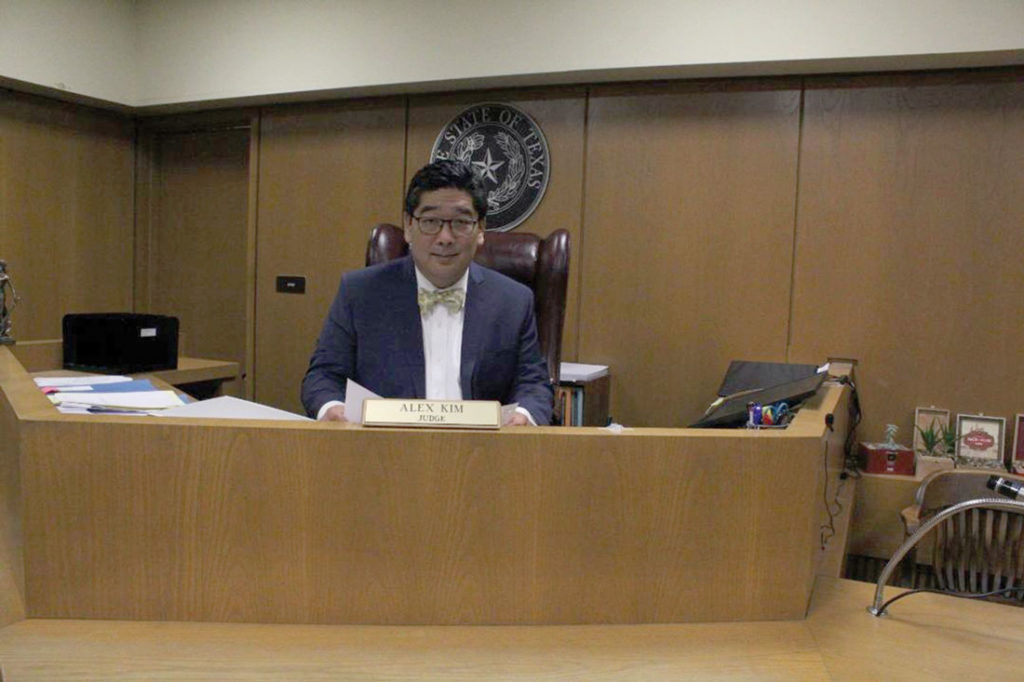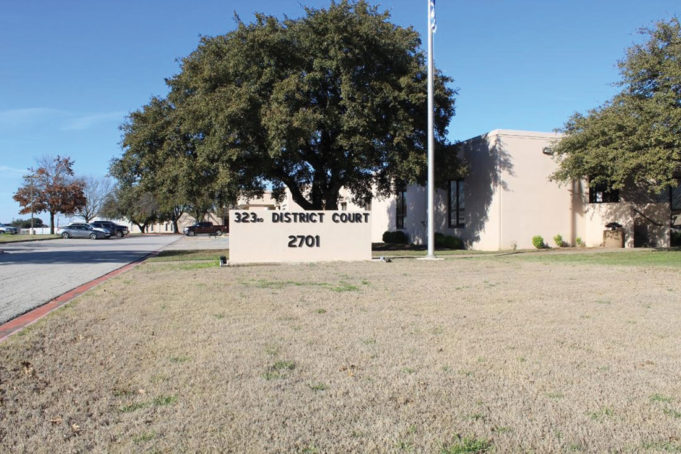Tarrant County judges typically don’t make headlines. Since taking office in early 2019, Judge Alex Kim has made dozens.
Four months ago, he garnered strong support in conservative quarters for his intervention in the ongoing case of Tinslee Lewis, the critically ill 1-year-old who is currently on life support at Cook Children’s Medical Center. Kim signed a temporary restraining order preventing Lewis from being taken off life support. He was later recused from overseeing that case at the request of the hospital.
Late-night poker games in his courthouse chambers and his chastising of one sex trafficking victim have left many questioning his leadership abilities, but a recent meeting of district judges showed his base of support to be as strong as ever. Dozens of supporters with large buttons reading, “We Support Judge Kim” filled the halls of Tarrant County Family Law Center.
The closed-door session had been called to discuss the potential reallocation of hundreds of cases related to Child Protective Services (CPS) in Tarrant County. The cases are largely handled by the 323rd Family District Court, which is presided over by Kim. The reason for the vote (which ended with a majority of judges voting in favor of redistributing CPS cases) wasn’t clear.
Judge David Evans, who presides over Tarrant County’s 48th Judicial District Court, had stated earlier that there has been a 50-percent increase in the number of juvenile and CPS cases over the last five years. The effort to spread those cases over Tarrant County’s six other family district judges is part of an effort to increase efficiency in the courts, Kim was told.
Several individuals I spoke to who work in child welfare said there was a link between the vote and a series of controversial moves Kim made during his first year in office.
“He has shown a complete disregard for rules and ethics,” one family lawyer told me outside the closed meeting. She asked that her real name not be used, given the strong opinions surrounding Kim, so we’re calling her Karen. She was joined by her colleague Susan (also not her real name).
Susan said that Kim “has the capability to be a great judge, but he needs to focus on the kids and to find a way to not make it political.”
Kim’s supporters and critics seemed to agree that the closed-door nature of the session was a poor decision. The meeting was initially announced as open to the public.
“Why is this hearing closed?” Kim supporter Jackie Schlegel asked. “I think that’s concerning as a voter. The voters elected this judge, and he’s doing that job. Now, it appears that they are trying to keep the happenings away from the public he serves.”
Schlegel, who is the mother of three children, including one with special needs, disagreed with the outcome of the vote. She said Kim is a strong advocate for the children and families he presides over.
“I really feel like he represents the children,” she said. “He takes that role seriously. I consider myself a family rights advocate. I feel that Judge Kim looks at the whole picture. Anytime we remove a child from a home, there is significant trauma [experienced by that child]. I have worked with families all across Texas who have had their children wrongfully removed. There is no doubt that there is a role for agencies [like CPS], but we need to work together as a community to make sure that we are honoring the rights of all who are involved.”
Adding urgency to the meeting was a precipitous drop last year of the number of foster children who were assigned court-appointed child advocates known as CASAs, although Kim said he supports adding 300 new CASA cases over the next few months. Around 75 percent of CASA’s assignments come from the 323rd District Court, according to data collected by the child advocacy group.
CASA has recently become the target of criticism by right-wing groups like Empower Texans and Texas Right to Life. The critics say the charity lacks public accountability, given its frequent access to sensitive CPS records. While some see collusion between Kim and critics of CASA, Kim maintains he has not targeted CASA for attack on behalf of any outside group.
Under Kim’s first year in office, the 323rd District Court, known as Juvenile Court, has seen the number of CASAs who were assigned cases drop from 282 in 2018 to 62 in 2019, according to figures provided by CASA. Tarrant County’s six family courts appointed 176 children to the nonprofit in 2019. CASA directors estimate that the ongoing trickle of cases that were appointed CASAs under Kim’s tenure has led to hundreds of children being cut from the benefits of the court-appointed volunteers, although those numbers are once again moving in favor of CASA.
Kim maintains that those statistics only tell part of the story. CPS cases have moved more quickly and with better outcomes under his watch, he told me.
•••••
After winning the Republican primary for Texas’ 323rd District Court in March 2018, Kim began his campaign against Democrat James Teel, who was an associate judge for the 323rd at the time. The standing judge for that court, Tim Menikos, had announced that he was not seeking re-election.
Looking back, CASA of Tarrant County CEO Don Binnicker sees the resulting campaign as the beginning of an unintended rift between CASA of Tarrant County and Kim. Binnicker said CASA employees had a working relationship with Teel, understanding his position at the time as an associate judge in one of Tarrant County’s family courts. Teel attended several CASA events. The resulting photos on social media made for the appearance of a cozy relationship between the political candidate and the child welfare group.
Binnicker noted that CASA does not endorse candidates and does its best to avoid any appearance of favoritism. Kim’s decision to not meet with CASA staffers until the election came off as a snub, but Binnicker thought the kerfuffle would blow over with time.
Four months into his new position, Kim learned of a social media post related to four local foster children. A CASA member had posted about the need for volunteers who could provide “kind and loving arms” for the children, Binnicker said. The names of the children were not given.
Word reached Kim, who saw the post as a potential breach of child privacy and an overstep on the part of the CASA volunteer. The next month, Kim ordered the volunteer to appear in court. The judge was weighing whether to hold the volunteer in contempt of court. CASA supporters saw that decision as an attempt to intimidate the volunteer. Kim maintains that he was simply trying to learn the facts of the case. Stephen Ables, the presiding judge of the 6th Administrative Judicial Region, stepped in and recused Kim from overseeing the contempt motion before dismissing the case altogether at a later hearing.
Kim’s biggest criticism has been his handling of CASA cases, but he’s not alone in that area. Texas CASA has been under scrutiny since the 2019 release of a study that was paid for by Texas CASA in 2017.
In November 2019, the Austin-American Statesman found that “Texas foster children with court-appointed special advocates are less likely than other foster children in the state to be reunited with their birth parents or placed in the care of relatives. Children with CASA volunteers have 16 percent lower odds of returning to their home of removal, compared with foster children without CASA involvement.”
What’s missing from that data is whether reunification is always best for the child. Parental rights go only so far when Mom is unwilling to address drug addictions or Dad has a history of abuse.
Binnicker said he has worked hard to ensure that volunteers who work with CASA of Tarrant County understand how potentially damaging parental termination can be for both parents and children. Recent CASA of Tarrant County data shows that 95 percent of children who had a CASA volunteer were reunified with parents, placed permanently with a relative or family friend, or adopted by non-relatives. By contrast, only 77 percent of the children without a CASA found permanent homes.
Following Kim’s April recusal, the number of CASA appointments dropped sharply over the next three months. What appeared as retaliation to many was simply judicial prudence, said 323rd assistant court coordinator Mary Kelleher.
“It’s disappointing to hear people say Judge Kim didn’t appoint CASA advocates in May, June, and July 2019 because he was mad at CASA,” she said. “Judge Kim had been recused from a CASA case during that time, and of course he wouldn’t rule on anything related to CASA while recused.”
Kelleher, a former Tarrant Regional Water District board member, said she met Kim while campaigning for election to the TRWD board. She had her doubts about him, because of his lack of experience in family law.

“Judge Kim respects and follows the law and is doing an outstanding job representing the people who elected him as the district judge of the 323rd,” she said. “It’s really a shame this situation has escalated to this point.”
Kim said he supports the mission of CASA or any group that seeks to support children in Tarrant County’s overstretched foster care system, but he also cares about parental rights, including the privacy rights of parents who may have sensitive CPS records released to CASA volunteers.
Through emails, Binnicker made the case for the important role CASA plays in supporting local foster children. CASAs undergo extensive training and often see to the material and emotional needs of the children they work with.
Tarrant County ranks third highest among Texas counties in the number of confirmed cases of abuse and neglect, according to the Texas Department of Family and Protective Services. Conservatorship of CPS cases was recently handed over to Our Community Our Kids (OCOK), part of the nonprofit ACH Child and Family Services. As part of the Texas Legislature mandate, CASA will now coordinate its efforts with OCOK.
Binnicker said, “CASA has a good working relationship with CPS, OCOK, and ACH Children and Family Services, and our leadership has attended collaboration meetings regarding this transition for the past couple of years. As always, our goal is to advocate for the best interest of children in foster care, and we know this will be especially important as conservatorship cases move from CPS to OCOK.”
Over the last year, after Kim cut the number of CASA assignments, Binnicker said his team began reaching out to local politicians, the Tarrant County Commissioners Court, and foundations for advice and support.
“CASA of Tarrant County,” Binnicker said, “shares Judge Kim’s desire to reunite foster children with biological parents or at least a close relative. We want these children to go back to live with family, if it is possible and safe to do so. If it can’t be with Mom and Dad, it can be grandparents, other relatives, or someone else that has a close relationship with the children.”
•••••
The halls of the 323rd were completely empty by the time I met Kim on a late afternoon recently. Earlier that day, the halls would have been packed with children of all ages, he told me. Speaking inside his courtroom, Kim said he would not be able to discuss CASA. The topic has become heated, he said, and engaging in a back and forth argument through the press would not be appropriate. Instead, we chatted about his first year in office and his efforts to improve the CPS case workflow.
Kim placed a graph on the table that read, “Case Duration (Days) from File Date.” The chart marked how much time elapsed from the time a CPS case was filed until it was disposed of, which could mean parental termination or reunification. When Kim began work on January 2, 2019, many of the cases before his court were nearing a state-mandated deadline of 544 days. If the 323rd did not rule on the case by then, the case was automatically dismissed.
An automatic dismissal could mean that normal parental rights were restored to a parent who was in prison or addicted to meth or heroin, Kim said. Kim had two urgent reasons for shortening the amount of time the cases lingered on. Beyond concerns over cases being dismissed at 544 days without proper vetting by his court, Kim said that every day a child is in a foster home is a day that parents miss out on important life events.
“The parents miss birthdays, first steps, first words, the first time their child rolls over or sits up,” he said. “Some studies show every day spent in foster care without permanency can be harmful to the child. Statistically, once a child has been placed in four different foster homes, every bad social metric has an increased chance of being triggered. There is an urgency to ensuring that these kids don’t get bounced around. If they do, they are statistically more likely to become future parents with their own CPS cases.”
Shortly after taking over the 323rd’s CPS cases, Kim began cutting back on the number of six-month extensions that his court granted. The extensions, which were supposed to be reserved for “extraordinary circumstances,” were given out too frequently, Kim said.
“I was consistent” about not automatically granting the extensions, Kim said. “The attorneys told the parents, ‘You have to do this plan.’ Some of these programs take months to do. If we get 10 months into your case as a parent and you haven’t started a four-month program, you risk losing your kid. Imagine what happens? The parents start doing” the required programs.
It’s human nature, he said, referring to the effectiveness of deadlines in all walks of life. Kim said he still grants occasional extensions, but they have to be truly for extraordinary reasons.
After spending a year studying effective practices, Kim is cautiously optimistic about how CPS cases will be handled by his peers.
“I have faith that the judges can handle the CPS cases” dutifully, he said. “The hard part [goes beyond] the law. The hard part is dealing with the human misery, looking a parent in the eyes and saying, ‘You will never see your child again. It’s done.’
“Some of these parents have been in prison,” Kim continued, “and they don’t realize that the last time they will ever see their kids was before they were in prison. There is a lot of heartbreak and misery in these cases. I’ve grayed a lot this year. It weighs heavy on your heart.”
Logistically, Kim doesn’t see how the redistribution won’t add to lines of bodies and longer wait times in the family courts. Downtown parking will be an issue, he added.
The two family lawyers I spoke with the day before had a different opinion. Karen pointed toward four nearby courts that she said are underutilized at the moment. She also believes that the cleaner and newer Downtown location will present a friendlier and more inviting environment than the older court building where Kim works. There are significant aesthetic differences between the two locations from what I saw.
The recent vote by the board of district judges means that Kim will not receive new CPS cases as of March 1, he said. That still leaves thousands of juvenile criminal cases to oversee. Kim said he will apply the same research and use of best practices to criminal cases that helped him improve the workflow and outcomes of CPS cases. He said that a zero-tolerance policy toward gun use has led to a decrease in juvenile cases that involve firearms.
“If you had a gun, you are not getting out,” he said. “I’m not going to let you return to the community until we figure out [the details of your case]. Even an airsoft gun means you were willing to make someone think they may die.”
In today’s social media and texting environment, word spreads quickly. Kim said most minors in Tarrant County have gotten the word that the 323rd court will not release minors who are caught with a firearm. Although the week of my visit had seen a spike in armed robberies, Kim said the number of children and teenagers in detention is about half of what it was when he took office.
•••••

Much of Kim’s tenure has been overshadowed by politicization. Kim’s endorsements by conservative groups like Empower Texans and Texas Right to Life have fueled speculation that he is in the pocket of those right-wing groups, something Kim steadfastly denies.
In 2018, at the height of his campaign, Kim receive $500 from Texas Gun Rights while contributing $100 to Empower Texans and $150 to Texas Right to Life for “event expenses” related to his in-person visits to both groups.
One right-leaning blog, Texas Scorecard (which regularly publishes content from Empower Texans), said that the recent vote to disperse CPS cases was the result of “judges hiding their heads in the sand and buckling under the pressure of CPS, CASA, and Cook Children’s.”
Kim said he has been criticized because of his decisions, but everyone has the “First Amendment right to criticize their elected officials and to freely associate with whom they want.”
If anyone came to support him, he said, it wasn’t because of any announcement or effort on his part.
Kim said he is a strict constitutionalist, conservative, and Christian, but politics do not shape his courtroom decisions. If people of any political persuasion find something of value in his leadership, he believes it is because he isn’t “squishy” on issues like parental rights and civil liberties. The vote by the board of district judges raises questions about how votes are treated in Tarrant County, Kim added.
“The voters voted for a judge for each court,” he said. “We are a government of the people, by the people, and for the people. Personally, I would have preferred to wait until the next election cycle. That way, the voters can pick who hears the CPS cases. Does the vote make me hesitant to run again? Not really. I enjoy working juvenile cases.”
Susan agrees that Kim’s background in criminal law will be of value in his two remaining years in office.
“Having the opportunity to capitalize on his strengths is a good thing,” the family lawyer said. “He can clean and streamline the juvenile system. He needs to show that he is taking the ethics of his office seriously. It’s been a year, but that hasn’t happened.”
Binnicker said CASA of Tarrant County is ready to work with the new system of evenly distributed foster children cases. His group has experience working with all six family courts, he said.
Despite the statements by members of the Tarrant County Board of District Judges, it is hard to see the reshuffling of CPS/OCOK cases as anything but a rebuke of the family judge who has garnered strong support in some quarters of Tarrant County and mistrust in others.
The embattled judge said he remains steadfastly engaged in improving outcomes for the children and teenagers who enter his court. Parental rights represent the most fundamental liberty he said he can think of other than life itself.
“My life goal was never to become a judge,” he said. “The opportunity was there. I wanted to make Tarrant County a better place by protecting parental rights and individual liberty. I do that every day, and that’s what I love.”













Kim ran for another bench before running for this one. He wanted to be a judge, not necessarily the juvenile judge. He ran against a much more qualified candidate in the primary and a second much, much more qualified candidate in the general election. Both of his opponents would have been outstanding judges. Kim had the North East Tarrant County tea party support him. They don’t seem to believe in competence or experience. “Conservative” bona fides are all that matters to them. I don’t know Kim, but people who do say he is a nice guy, just not very experienced as a lawyer. That is showing now.
well ive seen firsthand how corupt the cps organization is. I recently learned that the cps case workers get financial bonus’s for the number of children they remove from their homes. So they lie, cheat, and forge to make the removals happen. This infuriates me. Someone needs to uphold the parental rights. BECAUSE THE CASE WORKERS ARE THE MOST CORRUPT PEOPLE ON THE PLANET.
Has anyone experienced them not getting like the paperwork and stuff for their cases well I had a GPS case and I was told that I would receive court orders court dates like updates on my kids from the court and I never received none of them and they look at me like if I’m lying about it but I got the post office to an extend you an email to show you an email everyday and I’ve never received anything or do I have to go buy a court order I’ve never received and I hate the system for the simple fact is promise that would never mind the youngest son was placed with his grandparents in Lubbock that they were going to going to cover the cost of transportation to make sure the siblings and have a good strong relationship they didn’t do it not one time and now they’re trying to do the same thing to my daughter except for they want to put her up for adoption and her brothers and sisters don’t have they don’t have to that’s not fair right but it’s supposed to keep siblings and all that together I did all my classes and they lost my paperwork not once the twice yeah I’m still not the best person yeah I’m not the best person by far but you’re looking at your case worker they have the power to break up family’s
And my case has been open for 8 years and the more I accomplished the more I got demoted so at the end I just said I just quit I never quit the visits I would never quit visiting my kids but I quit doing anything that they asked me to do we went from eating at Chick-fil-A and McDonald’s to in the CPS office with the case worker in the room with us can’t call my kids on the phone because I have to have the caseworker on the freeway also
My granddaughter was removed by corrupt CPS and my daughters parental rights were terminated yesterday. We are devastated. They have lied to the point of insane. They cheated and threatened my daughter saying she would never see my granddaughter again if she did not voluntarily relinquish her rights. We are trying to appeal. Where to go? The attorneys work on behalf of CPS, not the parents or children.
MY PRECIOUS GRANDDAUGHTER HAS BEEN KIDNAPPED!!! And we are in shock!!!
Dear God, how are we going to get her back? The CPS file was sealed to cover up the lies and falsified documents. We have exhausted our finances paying attorneys who have done less than nothing. Who do we turn to? This is the most insanely corrupt system ever!!!!!
My God, in my own country, in my own home town.
http://www.returnmychild.com
My name is Sean blumer and I will help pay for the services that Mr.Scott provides in returning your grand daughter home🤟🏼
Generally, the worse conditions a child is left in, the more money the state and courts make. Both with CPS removal and between parents. Removal and conflict is very lucrative, so abuse is necessary to them.